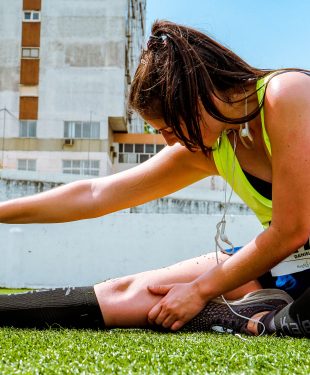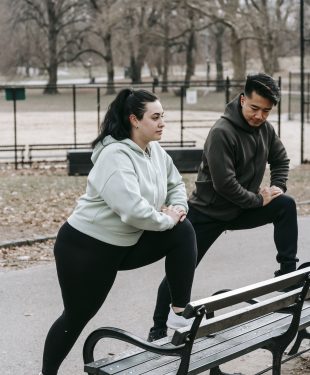Today we want to share 9 ways to prevent recurring injuries. Injuries can be extremely painful and affect your ability to live your life to the fullest. Suffering a setback in your injury recovery isn’t the best news, yet it is common. A Gainesville study showed that recurring injuries account for over 10% of all injuries, increasing your risk of further pain and discomfort, and can affect your ability to work safely and effectively. Whether you’re an athlete or want to stay active, taking steps to prevent recurring injuries is necessary. Below are 10 ways to do so.
- Improve your flexibility
Improving flexibility can help prevent recurring injuries by increasing the range of motion in your muscles and joints. Regularly stretching helps alleviate stiffness and tension in your muscles, making them more resistant to injury. Increased flexibility can also reduce the stress on your muscles and joints during physical activities, reducing your exposure to injury. It is vital to gradually increase the intensity and duration of stretches over time and to warm up before stretching to prevent straining your muscles.
- Strengthen your muscles
Your muscles may sometimes struggle to bear your body’s weight and support the joints when recovering from an injury. You don’t want to put too much strain on your body after weeks or months from the treatment room. You can do a few strength training exercises to improve posture and balance and

Photo by on Pexels
help to protect the muscles and joints from further injury. It is essential to start with basic exercises focusing on developing control and stability before progressing to more complex exercises involving higher loads. Additionally, allow your body adequate time for recovery after strength training to allow the muscles to repair and rebuild.
- Eat a balanced diet
Eating a balanced diet ensures that your body is properly fueled and can heal quickly and efficiently without any drawbacks. Research has shown the importance of nutrition, such as calcium, vitamin D, and C, for injury prevention and recovery. Additionally, eating a balanced diet can help to provide the nutrients needed to support muscle and joint health and help to reduce the risk of fatigue and other conditions that can increase the likelihood of injury. Finally, eating a balanced diet can help to improve your overall health and well-being, reducing the risk of injury.
- Don’t skip warm-ups
Warming up before physical activities can help prevent recurring injuries by increasing oxygen flow to the muscles and joints, improving their elasticity and range of motion. Dynamic stretchings, such as jogging and lunge walking, can help to prepare the body for activities and improve flexibility. Warm-up exercises can reduce the risk of sudden movements and exertion, leading to fresh injuries. However, ensure that the warm-up is tailored to the specific activity and gradually increase the intensity over time.
- Wear protective gear
Yes, protective gear can help to prevent injury recurrence. Protective gear, such as helmets, pads, and others, can help to reduce the risk of injury by providing a layer of padding and protection against impacts. They can help reduce the severity of an injury if it does occur, as the gear’s padding and other features can help absorb some of the impacts and reduce the force of the blow. Also, wearing protective gear promotes safety and security, which helps reduce the risk of injury by encouraging people to take the necessary safety precautions.
- Take breaks
Taking regular breaks is crucial for part of injury recovery and preventing recurrence. It is tempting to ignore the need for an extended break away from work when you are worried about losing your job or missing out on a potential promotion. However, take as much of a break as possible to fully recover. Regular breaks from physical activities or repetitive tasks can reduce fatigue and the risk of overuse injuries. Prioritize breaks if you are looking for ways to boost your energy and ensure you remain alert and focused while reducing the chances of injury recurrence. Taking breaks can also improve your mental health, giving you time to relax, refocus, and recharge.
- Stay hydrated
Hydration is crucial for injury recovery, as it helps to ensure that your body is properly fueled and can heal quickly and efficiently. Dehydration can lead to fatigue, muscle cramps, and reduced performance, contributing to an increased risk of injury recurrence. Proper hydration helps your body to flush out toxins and other waste products that can cause inflammation and pain. Adequate hydration also helps maintain your body’s temperature and electrolyte balance, which are essential for optimal muscle and joint function. Drinking water helps to keep your body cool and can help to reduce the risk of heat-related injuries. By maintaining proper hydration, you can help to avoid injury recurrence and promote recovery.
- Avoid overtraining

Photo by on Pexels
Overtraining can lead to fatigue, stress, and exhaustion, and these factors could increase your risk of injury recurrence. Unfortunately, it is common among athletes and fitness enthusiasts who ignore their body’s need for managed workloads and regular breaks after being sidelined by an injury for months. Unfortunately, attempting to take this shortcut to reach your fitness or performance goals can cause an injury recurrence and potentially spend even more time inactive. Listen to your body, take breaks, and gradually increase the intensity of your workout to avoid a fresh or old injury resurfacing.
- Work with a professional
Even with all the tips above, it is best to consult a professional when recovering from an injury. A professional can assess your needs and provide tailored advice to prevent further injuries or re-occurrence. They can also help you identify potential risks, guide correct form and technique, and develop a comprehensive exercise program to help you stay injury-free. Additionally, they can provide rehabilitation guidance and advice on lifestyle changes that can help you stay healthy and active. You may also follow these experts’ tips on returning to work after an injury for the best recovery.
While we focus so much on injury prevention, some injuries are inevitable and usually lead to further injuries. However, you can follow the tips below to prevent injury recurrence and stay active and effective.
Read more lifestyle and wellness articles at ClichéMag.com
Images provided by Flickr, Unsplash, Pexels, Pixabay & Creative Commons



